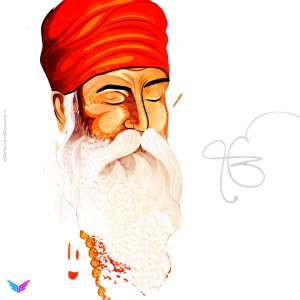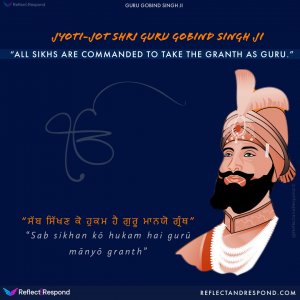Sikh Quotes from Bani of Gurus in Sikhism:
1. Guru Nanak Dev Ji (1469-1539)
2. Guru Angad Dev Ji (1504-1552)
3. Guru Amardas Ji (1479-1574)
4. Guru Ramdas Ji (1534-1581)
5. Guru Arjan Dev Ji (1563-1606)
6. Guru Hargobind Ji (1595-1644)
7. Guru Har Rai Ji (1630-1661)
8. Guru Harkrishan Ji (1656-1664)
9. Guru Teg Bahadur Ji (1621-1675)
10. Guru Gobind Singh Ji (1666-1708)
Guru Nanak Dev Ji: (Gurmukhi: ਗੁਰੂ ਨਾਨਕ), was the founder and first Guru of Sikhism, was born in the year 1469, in the village Talwandi which is located in the Punjab region of the Indian subcontinent.
READ MORE on Guru Nanak Dev Ji Quotes
Guru Amar Das Sahib Ji (ਗੁਰੂ ਅਮਰ ਦਾਸ) (1479 – 1574), was the third of the Ten Gurus of Sikhism.
Guru Amar Das ji composed 907 hymns, that are incorporated in the Sri Guru Granth Sahib Ji.
READ MORE on Quotes by Guru Amar Das Ji

Sri Guru Ram Das Ji was (ਗੁਰੂ ਰਾਮ ਦਾਸ) (1534-1581) was the fourth of the Ten Gurus of Sikhism.
Sri Guru Ram Das Ji composed 638 holy hymns in 30 different ragas of Indian classical music.
READ MORE on Quotes by Guru Ram Das Ji
Guru Arjan Dev Ji ਗੁਰੂ ਅਰਜਨ (15 April 1563 – 30 May 1606) was the fifth of the ten total Sikh Gurus. He compiled the first official edition of the Sikh scripture called the Adi Granth, which later expanded into the Guru Granth Sahib which is the eleventh and eternal Guru of Sikhs.
Read More on Quotes by Guru Arjan Dev Ji
Guru Har Rai Ji (ਗੁਰੂ ਹਰਿ ਰਾਇ) (31 January 1630 – 20 October 1661) was the seventh of the Ten Gurus of Sikhism and became Guru on, 19 March, 1644 following the footsteps of his grandfather, Guru Har Gobind Ji.
Read More on Quotes by Sri Guru Har Rai Ji

Guru Tegh Bahadur Ji (1666-1708 C.E.) was the ninth guru of Sikhs. A poet, a thinker, and a warrior, Guru Teg Bahadur Ji carried forward the light of sanctity and divinity of Guru Nanak Dev Ji and the subsequent Sikh Gurus.
Read More on Quotes by Guru Teh Bahadur Ji
Guru Gobind Singh Ji (1666-1708 C.E.) was the tenth guru of Sikhs. Guru Gobind Singh Ji was also a scholar, writer and a poet, well-versed in many languages: Sanskrit, Persian, Punjabi, Arabic, Awadhi and Braj Bhasha.
Read More on Quotes by Guru Gobind Singh Ji
Sikh Banis:
- ANAND SAHIB
- ARDAAS
- CHAUPAI SAHIB
- JAPJI SAHIB
- JAAP SAHIB
- KIRTAN SOHILA
- REHRAAS SAHIB
- TVAI PRASADH SAVAIYE
Ardas is an integral part of Sikh religion. It is a concise and straight communion with God. It is the prayer offered by the Sikhs before or after any function or activity or occasion, happy or sad. Literal meaning: ‘Ardas’ is derived from the Persian word Arz meaning supplication and Dast meaning hands. In other words, a supplication to a higher power not supported by a written prayer. Ardas is addressed to the supreme- being, all those present stand with folded hands and closed eyes facing Guru Granth Sahib. The person leading in Ardas says the prayer where as the congregation listens to it and joins in at certain intervals to say, “Waheguru.”
The text of Ardas is divided into three parts. The first part appears as a prologue to Chandi Dee Var composed by Guru Gobind Singh invoking blessings of the Sword, God and then ten Gurus and Guru Granth Sahib in the order of precedence and must be rendered without any additions or deletions. The second part is composed by Sikh scholars and must also be recited as prescribed. It recounts the events of Sikh history. It reminds the listener of the great sacrifices made by the Sikh martyrs for the protection of the Sikh religion. The third part consists of thanks giving and can be modified according to the nature of the occasion. The re-citer then mentions the purpose and the occasion for offering the prayer. Then he invokes the Lord’s blessings for the success of the function, the project undertaken or to be undertaken; peace progress health and welfare of an individual / family. Ardas, after completion of a task, is an expression of grateful thanks to the Lord for the success granted in the execution of the task. Last but not the least, in the Ardas, a humble appeal is made:
O Lord, save us from lust, wrath, greed, undue attachment and conceit. Let there be peace all around. O Father, grant success to everyone in his / her efforts. Bestow the bliss of Holy Name on us all and keep us in the company of persons devoted to thy-self. O God, give us humility in behaviour and nobility in thought. Forgive us for our shortcomings and acts of omission and commission. May your Holy Name be ever in ascendance and may peace and progress come to the entire mankind.
Leading in Ardas: No priest is required to address it. Anybody, man or woman, old or young, fully conversant with the text of Ardas and able to express himself / herself in a correct, coincise and moving manner in the congregation (Sangat), can lead in Ardas. In Sikhism Ardas is performed in standing position with folded hands
Importance of Ardas in Sikhism :The Sikh’s conception of God is personal. He moves in him like a fish in the water, and lives with him like a wife with her husband. He is in constant communion with him through prayer. Therefore prayer is much used in Sikhism. No ceremony, either religious or secular is complete without prayer. The Sikh Scripture chiefly consists of prayers:
The Sikh has to bring himself into prayerful mood before he addresses himself to God. Therefore the Sikhs offer following prelude to Ardas:
ਤੂ ਠਾਕੁਰੁ ਤੁਮ ਪਹਿ ਅਰਦਾਸਿ ॥
तू ठाकुरु तुम पहि अरदासि ॥
Ŧū ṯẖākur ṯum pėh arḏās.
You are our Lord and Master; to You, I offer this prayer.
ਜੀਉ ਪਿੰਡੁ ਸਭੁ ਤੇਰੀ ਰਾਸਿ ॥
जीउ पिंडु सभु तेरी रासि ॥
Jīo pind sabẖ ṯerī rās.
This body and soul are all Your property.
ਤੁਮ ਮਾਤ ਪਿਤਾ ਹਮ ਬਾਰਿਕ ਤੇਰੇ ॥
तुम मात पिता हम बारिक तेरे ॥
Ŧum māṯ piṯā ham bārik ṯere.
You are our mother and father; we are Your children.
ਤੁਮਰੀ ਕ੍ਰਿਪਾ ਮਹਿ ਸੂਖ ਘਨੇਰੇ ॥
तुमरी क्रिपा महि सूख घनेरे ॥
Ŧumrī kirpā mėh sūkẖ gẖanere.
In Your Grace, there are so many joys!
ਕੋਇ ਨ ਜਾਨੈ ਤੁਮਰਾ ਅੰਤੁ ॥
कोइ न जानै तुमरा अंतु ॥
Koe na jānai ṯumrā anṯ.
No one knows Your limits.
ਊਚੇ ਤੇ ਊਚਾ ਭਗਵੰਤ ॥
ऊचे ते ऊचा भगवंत ॥
Ūcẖe ṯe ūcẖā bẖagvanṯ.
O Highest of the High, Most Generous God,
ਸਗਲ ਸਮਗ੍ਰੀ ਤੁਮਰੈ ਸੂਤ੍ਰਿ ਧਾਰੀ ॥
सगल समग्री तुमरै सूत्रि धारी ॥
Sagal samagrī ṯumrai suṯir ḏẖārī.
the whole creation is strung on Your thread.
ਤੁਮ ਤੇ ਹੋਇ ਸੁ ਆਗਿਆਕਾਰੀ ॥
तुम ते होइ सु आगिआकारी ॥
Ŧum ṯe hoe so āgi
ākārī.
That which has come from You is under Your Command.
ਤੁਮਰੀ ਗਤਿ ਮਿਤਿ ਤੁਮ ਹੀ ਜਾਨੀ ॥
तुमरी गति मिति तुम ही जानी ॥
Ŧumrī gaṯ miṯ ṯum hī jānī.
You alone know Your state and extent.
ਨਾਨਕ ਦਾਸ ਸਦਾ ਕੁਰਬਾਨੀ ॥੮॥੪॥
नानक दास सदा कुरबानी ॥८॥४॥
Nānak ḏās saḏā kurbānī. ||8||4||
Nanak, Your slave, is forever a sacrifice. ||8||4||
NITNEM
ਜਪੁਜੀ ਸਾਹਿਬ – JAPJI SAHIB
Japji Sahib is the first sacred composition found in the main Sikh holy scripture called the Guru Granth Sahib. It is a famous and concise summary of the Sikh philosophy which was compiled by the founder of Sikhism and the first spiritual guide of the Sikhs known worldwide as Guru Nanak. It begins with Mool Mantra and then follow 38 paudis (stanzas) and completed with a final Salok at the end of this composition. The 38 stanzas are in different poetic meters.
ਜਾਪੁ ਸਾਹਿਬ – JAAP SAHIB
Jaap is the bani (set of hymns) uttered by Guru Gobind Singh Ji, the Tenth Sikh Guru, the Tenth Nanak. It is the first bani recorded in Sri Dasam Granth Sahib Ji from Page 1. It is one of the Five Banis recited by most Sikhs each morning and the bani that the Panj Pyare recite while preparing Amrit on the occasion of Amrit Sanchaar (Sikh Initiation), a ceremony held to admit initiates into the Khalsa Brotherhood. It is the second bani of the five in the daily morning prayer routine of a Sikh.

Chardi kala – Eternal resilience
What is Chardi Kala? In Sikhism, Chardi Kala Charhdi Kala, is the Punjabi term for aspiring to maintain a mental state of eternal resilience, optimism and joy;

Vaisakhi Khalsa Sajna divas
Sab sikhan ko Hukam hai guru manyo Granth – Jyoti jot divas Guru Gobind Singh
Joti jot means the day Guru Gobind Singh ji left his heavenly abode in 1708, at Hazur Sahib(Nanded) Maharashtra India.
This quote “All Sikhs are commanded to take the Granth as Guru” is by the last living Guru for the Sikhs, Guru Gobind Singh Ji. This was proclaimed by Guru ji when he felt that his call from Heaven had come and it was time for him to pass the successorship (gur gadi).

Why call her Bad? From her, Kings are born
Guru Nanak Dev Ji, believed men and women are equal and therefore women cannot be considered inferior. To woman we marry, of woman are we born, of woman conceived, by woman is the civilization continued. It is by woman that the entire social order is maintained. Then “why call her bad? From her Kings are born”

Man breaks flowers with one hand & offers with other hand
Guru Har Rai ji wrote this quote: “Man breaks flowers with one hand and offers them with the other, but the flowers perfume both hands alike.
The axe cuts the sandal tree,
yet the sandal perfumes the axe.“ in a letter.

Nanak naam Jahaj hai, chadhe so utre paar
The following lines “Nanak naam jahaj hai, chadhe so utre paar“, are often chanted by Sikhs. They were not written by Guru Nanak or appear in Sri Guru Granth Sahib. “Nanak naam jahaj hai, chadhe so utre paar. Jo sharda kar sevda, gur paar utaran haar.” Dohra Meaning of Quote is: “O Nanak, the name of God is a ship, one boards to alight across

Whosoever has come shall depart – Guru Nanak
Death is Inevitable: Gurbani teaches us that the death is inevitable. It is law of the nature. Whosoever is born must die. Rich and poor, young and old all have die one day. Guru Nanak Dev Ji on the subject of death has written following quotes in Sri Guru Granth Sahib Ji: ਜੋ ਆਇਆ ਸੋ ਚਲਸੀ ਸਭੁ ਕੋਈ ਆਈ ਵਾਰੀਐ ॥(474-2) jo aa-i-aa so chalsee sabh ko-ee aa-ee vaaree-ai. Whoever has come, shall

Guru Nanak Dev Ji’s Teachings: Kirat Karo, Naam Japo, Vand Chako
On the occasion of Guru Nanak Dev’s Ji’s birthday let’s Read & Reflect on Guru ji’s main teaching for Sikhs. Guru Nanak Dev Ji’s teachings are summarized as the Three Pillars of Sikhism: Kirat Karo Naam Japo Vand Chako Kirat Karo Guru Nanak Dev Ji asked the Sikhs to live as householders and practice “Kirat”: to earn an honest living. The term means to earn

Sab sikhan ko Hukam hai guru manyo Granth – Jyoti jot divas Guru Gobind Singh
Sab sikhan ko Hukam hai guru manyo Granth – Jyoti jot divas Guru Gobind Singh
Joti jot means the day Guru Gobind Singh ji left his heavenly abode in 1708, at Hazur Sahib(Nanded) Maharashtra India.
This quote “All Sikhs are commanded to take the Granth as Guru” is by the last living Guru for the Sikhs, Guru Gobind Singh Ji. This was proclaimed by Guru ji when he felt that his call from Heaven had come and it was time for him to pass the successorship (gur gadi).

HAPPY DIWALI & BANDHI CHOR DIVAS – FESTIVAL OF LIGHTS
Happy Diwali – the Indian Hindu festival of Lights. The Jains observe Diwali which marks the final liberation of Mahavira & the Sikhs celebrate Bandi Chhor Divas to mark the release of Guru Hargobind from a Mughal Empire prison along with 52 kings. For Hindus the festival marks Diwali symbolizes the spiritual “victory of light over darkness, good over evil, and knowledge over ignorance. From

Speak only that will bring you Honor
Do you control your mind or does your mind control you? This quote by Guru Nanak dev ji is guiding us that if we can conquer our mind, we can conquer anything. Read below on the story and analogy of mind like a horse that creates havoc when you try to tame it.

Conquer your mind and Conquer the world
Do you control your mind or does your mind control you? This quote by Guru Nanak dev ji is guiding us that if we can conquer our mind, we can conquer anything. Read below on the story and analogy of mind like a horse that creates havoc when you try to tame it.

AFFIRMATION: I am not alone, God is with me
I am not alone, GOD is with me! AFFIRMATION We all have limiting beliefs that prevent us from doing more than we think we can. We all go through tough times in our lives and often due to things that have happened in past, feel we are not capable, worthy or we can’t. We strongly believe that repeating an affirmation can change the way we

The Ignorant person is totally blind, He does not appreciate the value of the Jewel
Guru Amar Das Sahib Ji (ਗੁਰੂ ਅਮਰ ਦਾਸ) (1479 – 1574), was the third of the Ten Gurus of Sikhism. Guru Amar Das ji composed 907 hymns, that are incorporated in the Sri Guru Granth Sahib Ji. Gift of the prayer Anand Sahib, which is one of the Five Banis recited daily by devout Sikhs. “The ignorant person is totally blind he does not appreciate the value of the jewel” – Sri Guru Amar Das

God Himself is the Forgiver
This quote “God himself is the Forgiver” is by the last living Guru for the Sikhs, Guru Gobind Singh Ji.
ਤ੍ਵ ਪ੍ਰਸਾਦਿ ਸਵੱਯੇ – TVAI PRASADH SAVAIYE
Tav-Prasad Savaiye is a short composition of 10 stanzas which is part of daily liturgy among Sikhs (Nitnem). It was penned down by Guru Gobind Singh and is part of his composition Akal Ustat (The praise of God)
ਬੇਨਤੀ ਚੌਪਈ ਸਾਹਿਬ – CHAUPAI SAHIB
Benti Chaupai or Chaupai sahib is a prayer or Bani composed by the tenth Sikh Guru, Guru Gobind Singh Ji. This Bani is present in Charitar 404 of the Sri Dasam Granth Saahib Ji in Bani Ath Pakhyan Chairtar Likhyatey. This Bani is one of the five Banis recited by the initiated Sikh every morning. It is also a part of the evening prayer of the Sikhs called Rehraas sahib. The Benti Chaupee can be read at any time during the day to provide protection, positive focus, and energy.
ਅਨੰਦੁ ਸਾਹਿਬ – ANAND SAHIB
Anand Sahib: This Bani is part of the Nitnem (prayers) which are read by Sikhs in the morning. This Bani was written by Guru Amar Das Ji, the third Guru of the Sikhs and forms part of the 5 Baanis that are recited daily by Sikhs. It is said that the person who recites this Holy Baani daily with dedication, attention, and comprehension, will achieve Anand (Complete Happiness or Bliss) in life.
ਰਹਰਾਸਿ ਸਾਹਿਬ – REHRAAS SAHIB
Rehiras Sahib is the evening prayer of the Sikhs, which speaks of the greatness of Waheguru. As recorded in the Guru Granth Sahib, it contains the hymns of four different Gurus; Guru Nanak, Guru Amardas, Guru Ramdas and Guru Arjan Dev. Now part of the Rehiras Sahib the Benti Chaupai, attributed to Guru Gobind Singh was added to the Bani in the late 19th century. The verse speaks of the greatness of Waheguru and the ways in which ones actions assists one in attaining spiritual enlightenment, liberating one’s mind and soul.
ਸੋਹਿਲਾ ਸਾਹਿਬ – KIRTAN SOHILA
Kirtan Sohila: This is the night time prayer said by all Sikhs before they go to sleep. Three Sikh Gurus – Guru Nanak, Guru Ram Das and Guru Arjan – contributed five shabads in total to this bani on the pain of separation and celebrating the bliss of union with Almighty.
GURU GRANTH SAHIB
ਅਨੰਦੁ ਸਾਹਿਬ – ANAND SAHIB(BHOG)
The Anand Sahib of Guru Amardas is a literary masterpiece of devotional poetry; its aesthetic and symbolic elements will please the literary critic. The Anand reassures every one that they can experience both joy and bliss, without sacrificing the normal comfort and pleasures of life. Bliss is the destiny of man, Pain and suffering, though unavoidable, do not disturb the inner peace of that person who leads a purposeful and pious life, by obeying the Guru’s discipline.
ਆਰਤੀ – AARTEE
Aarti (also spelled arti, arati, arathi, aarthi) is spiritual term which means “To Unite with”. Aa means To come and Rati means To Unite. In Gurmat, Soul is genderless. The hymns are composed Soul being feminine as well as Masculine where Aarti as well as Aarta terms are used respectively.
ਲਾਵਾਂ – LAAVAN(ANAND KARAJ)
Guru Ram Das Sahib composed a beautiful bani called Laavan about the meaning of marriage to a Sikh couple – Effectively, the Guru defines a Sikh marriage in these 2 lines: “They are not said to be husband and wife who merely sit together. Rather they alone are called husband and wife, who have one soul in two bodies.”
ਆਸਾ ਦੀ ਵਾਰ – ASA KI VAAR
Asa-di-Vaar—means A ballad of hope; it is one of the basic sacred compositions for the Sikhs and is sung every morning in congregation in gurdwaras. The Var is an heroic ode which describes the brave deeds of a hero. It consists of 24 stanzas (Pauris) and 44 Staves (Salokas) and was originated by Guru Nanak later, Guru Angad added another 15 staves of his own
ਸੁਖਮਨੀ ਸਾਹਿਬ – SUKHMANI SAHIB
The word ‘Sukhmani’ means the psalm of equipoise or jewel of bliss. The Sukhmani Sahib has structural unity. It has 24 staves (Salokas), one of which begins each canto. There are 24 cantos, each containing 8 stanzas. Each stanza has ten lines, that is five couplets. There is also the unity of theme: the perfection of man mentally. morally and spiritually. The stave of each canto gives the gist of the stanzas that follow.
ਸਿਧ ਗੋਸਟਿ – SIDH GOSHT
The Sidh Gosht (Dialogue With The Siddhas) is a pious Bani that recounts a meeting of Guru Nanak Dev Ji with a group of Hindu ascetics (siddhs) who had renounced the world, living in the caves of the Himalayas.
ਰਾਮਕਲੀ ਸਦੁ – RAMKALI SADH
Ramkali Sadh, by Sundar, is an “elegy” (sadd, in Punjabi) included in the Guru Granth Sahib in Raag Ramkali . Sadd is a form of folk poetry prevalent in rural Punjab. Literally the term means an invocation call, hark or cry. This narration tells Sikh attitude towards physical death of a Gurmukh.It also narrates events of succession of Guru Ram Das over Guru Amar Das.
ਦਖਣੀ ਓਅੰਕਾਰੁ – DHAKANEE OANKAAR
Dhaknee Oankaru is a composition of Guru Nanak`s in the measure Ramkali in the Guru Granth Sahib. It is called dakhani because it was addressed to the priest of the Oarikar temple in the dakhan (South), on an island in the river Narmada, in Madhya Pradesh.
ਬਾਵਨ ਅਖਰੀ – BAAVAN AKHREE
Baavan Akhree, is composition fifth Sikh Guru, Guru Arjan Dev It is a poem constructed upon 52 (bavan) letters (akhar) of the alphabet. In this form of poetry each verse begins serially with a letter of the alphabet and comprises fifty five pauris or stanzas of eight lines each, preceded by slokas.
ਸ਼ਬਦ ਹਜ਼ਾਰੇ – SHABAD HAZARE
Shabad Hazaray is the Bani of longing for the beloved Guru. It was written by Guru Arjan when he was separated from Guru Ram Das, his father for a duration of time. During that period of separation he sent these three letters to his beloved Guru and father expressing his longing for the “blessed vision of the Guru”.
ਬਾਰਹ ਮਾਹਾ – BAARAH MAAHA
Bara Maha, is a form of folk poetry in which the emotions and yearnings of the human heart are expressed in terms of the changing moods of Nature over the twelve months of the year.
ਸੁਖਮਨਾ ਸਾਹਿਬ – SUKHMANA SAHIB
ਦੁਖ ਭੰਜਨੀ ਸਾਹਿਬ – DUKH BHANJANI SAHIB
Dukh Bhanjani is a paath (composition of sacred hymns) put together as they all address the same purpose. All the shabads in this paath are composed by the fifth Sikh Guru, Guru Arjan Dev in three raags – Raga Gauri,Raga Bilaval and Raga Sorath. This paath is done to alleviate any form of ailment (“dukh”) or hardship experienced by them. The word ‘dukh’ means a hardship or ailment or suffering causing a pain. The word ‘bhanjani’ means destroyer or crusher; hence the phrase “dukh bhanjani” means “Destroyer of Pain”. All the shabads in this composition are chosen at achieving this goal
ਸਲੋਕ ਸਹਸਕ੍ਰਿਤੀ – SALOK SEHSKRITEE
ਗਾਥਾ – GATHAA
Gathaa, title of Guru Arjan`s composition comprising twenty-four verses included in the Guru Granth Sahib in the praise of God and the importance of devotion to Him.
ਫੁਨਹੇ ਮਹਲਾ ੫ – PHUNHAY M: 5
ਚਉਬੋਲੇ – CHAUBOLAY M:5
ਸਲੋਕ ਭਗਤ ਕਬੀਰ ਜੀਉ ਕੇ – SALOK KABEER JI
ਸਲੋਕ ਸੇਖ ਫਰੀਦ ਕੇ – SALOK FARID JI
ਸਵਈਏ ਮਹਲੇ ਪਹਿਲੇ ਕੇ – SAVAIYE M: 1
ਸਵਈਏ ਮਹਲੇ ਦੂਜੇ ਕੇ – SAVAIYE M: 2
ਸਵਈਏ ਮਹਲੇ ਤੀਜੇ ਕੇ – SAVAIYE M: 3
ਸਵਈਏ ਮਹਲੇ ਚਉਥੇ ਕੇ – SAVAIYE M: 4
ਸਵਈਏ ਮਹਲੇ ਪੰਜਵੇ ਕੇ – SAVAIYE M: 5
ਸਲੋਕ ਮਹਲਾ ੯ – SALOK M: 9
Salok Mahalla 9, i.e. slokas of the composition of Guru Tegh Bahadur , form the concluding portion of the Guru Granth Sahib, preceding Guru Arjan`s Mundavani. The 57 slokas comprise some of the most moving poetry in the Guru Granth Sahib. Their music, imagery and other poetic features combine to capture the experience of life with lyrical intensity.
DASAM GRANTH
ਅਕਾਲ ਉਸਤਤ – AKAL USTATI
The word “Akal” means the “timeless primal being” and the word “Ustat” means “praise”. So together the words “Akal Ustat” means the “praise of the Almighty God”. Guru Gobind Singh, the tenth Sikh Guru writes praises of God with love and dedication saying that God is worshipped by various peoples in many different ways and with varying names and methods.
ਬਚਿਤ੍ਰ ਨਾਟਕ – BACHITAR NATAK
Bachitar Natak is an autobiography narrated by the tenth Sikh Guru, Guru Gobind Singh Ji, about the first 32 years of his life. The Guru has outlined the circumstances and history of the time and how great courage and strength was required to overcome the many hurdles that were upon the community
ਸ਼ਬਦ ਹਜ਼ਾਰੇ ਪਾਤਿਸ਼ਾਹੀ ੧੦ – SHABAD HAZARE PAATISHAHI 10
Shabad Hazaarey Patshahi Dasvin are composed in nine different ragas and are in the style of the Bishanpadas. In these Guru Ji has given expression to his philosophical and spiritual beliefs.
ਤ੍ਵ ਪ੍ਰਸਾਦਿ ਸ੍ਵੱਯੇ (ਦੀਨਨ ਕੀ) – TVAI PRASADH SAVAIYE ( DHEENAN KEE)
*Above are based on below references:
http://whatissikhism.com/downloads/Res-What_is_Sikhism_Series_7.pdf





